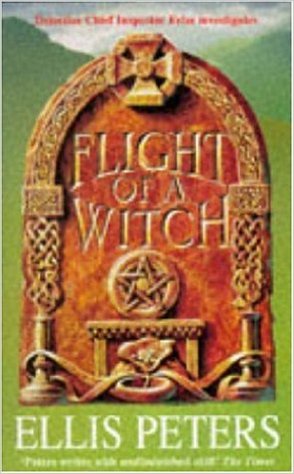Edith Mary Pargeter (1913-95) was a Shropshire lass born and bred, and she lived there until the close of her life. She became famous under her nom de plume, Ellis Peters, and in particular for her Brother Cadfael mysteries set large in Shrewsbury. She knew that English region bordering on Wales very well indeed, and her vivid descriptions of the region are found again and again both in her medieval mysteries, and the ones set in post WWII in the same region, in the fictional town of Comerford. Of Welsh ancestry, Pargeter often had Welsh protagonists or prominent characters in her novels. I freely confess I fell in love with the Cadfael mysteries a long time ago, and was reluctant to try her more modern mysteries simply because I did not think they could stand up to the very high standard of her medieval ones. Having now read the first two in the George Felse series which began to emerge in 1961, well before the start of the Cadfael series of twenty novels which ran from 1977-94, I feel my instinctive concerns were somewhat justified. These novels are interesting but at least the first two, ‘Fallen into the Pit’, and ‘Death and the Joyful Woman’ do not have the same magic and intrigue we find in the Cadfael series. But I may well need to revise this opinion as I read more.
The first two novels involve a literary device often called the wunderkind device. By this is meant that you have a young person, male or female, who comes along and shows up his or her elders by solving the crime, or figuring out the puzzle, or unraveling the mystery. In this case the wunderkind is Inspector George Felse’ son Dominic. Not only is this device used in both the first two novels, but it is used in the same way, namely Dominic decides to force the villain to reveal himself by doing something dastardly to Dominic himself, who has gotten too close to the truth and is about to unmask the bad guy. Using this sort of way of resolving the plot issues once, is one thing, twice is a pattern, and not surprisingly, it’s less convincing the second time around. And in both novels it is Dominic who finds key clues, in his spare time when he’s not doing his homework, that help solve the case.
Interestingly, the second novel in the series was highly praised and won the Edgar award for best novel in 1963. What then are the strengths of these novels? First of all, they may appeal to several generations of readers, and I will say to Christian parents now, these novels are quite suitable for children to read, who have enjoyed the adventures of the children in the Narnia tales, and perhaps they will be able to identify with some of the frustrations and struggles of Dom Felse. Secondly, of the mystery writers of her era, I would say that Edith’s powers of prose writing and vivid descriptions was second only to P.D. James when it came to British crime fiction. You can learn a lot about how to write beautiful prose by reading the novels of Pargeter. Thirdly, while Edith did not turn her novels simply into morality plays, nevertheless there are some good moral lessons indirectly taught about the nature of good and evil, right and wrong, honest and dishonest, fair and unfair in these novels without their becoming too preachy. You can enjoy the story all by itself, and try to solve the who dunnit, but along the way you can also learn some valuable life lessons from a generally Christian point of view. I once had a letter exchange with Edith, towards the end of her life, and she spoke quite clearly about her faith in ‘our Lord’. I had written her asking her about the faith of Brother Cadfael.
I’m looking forward to reading the third novel about a Welsh witch. I suspect if may be more along the lines of the medieval mysteries, to judge from the first few pages. Stay tuned. In the meantime, I say to Christian parents, here are novels that do not glorify violence or wicked characters, and are lessons in how to write lucidly and with a turn of phrase by a very literate writer. If your kids like the Harry Potter novels of J.K. Rowling (who also professes to be a Christian), they may enjoy these as well.












